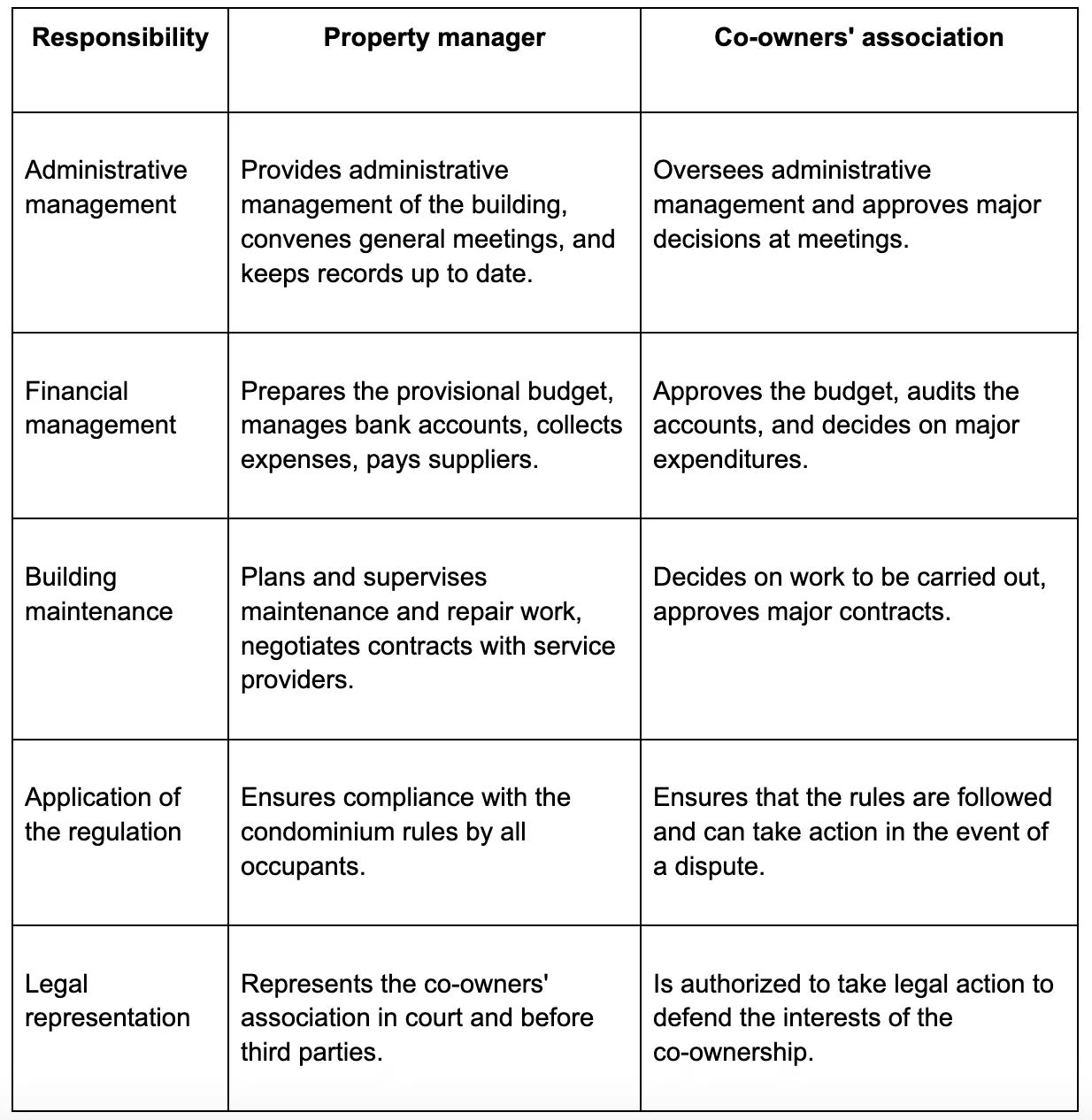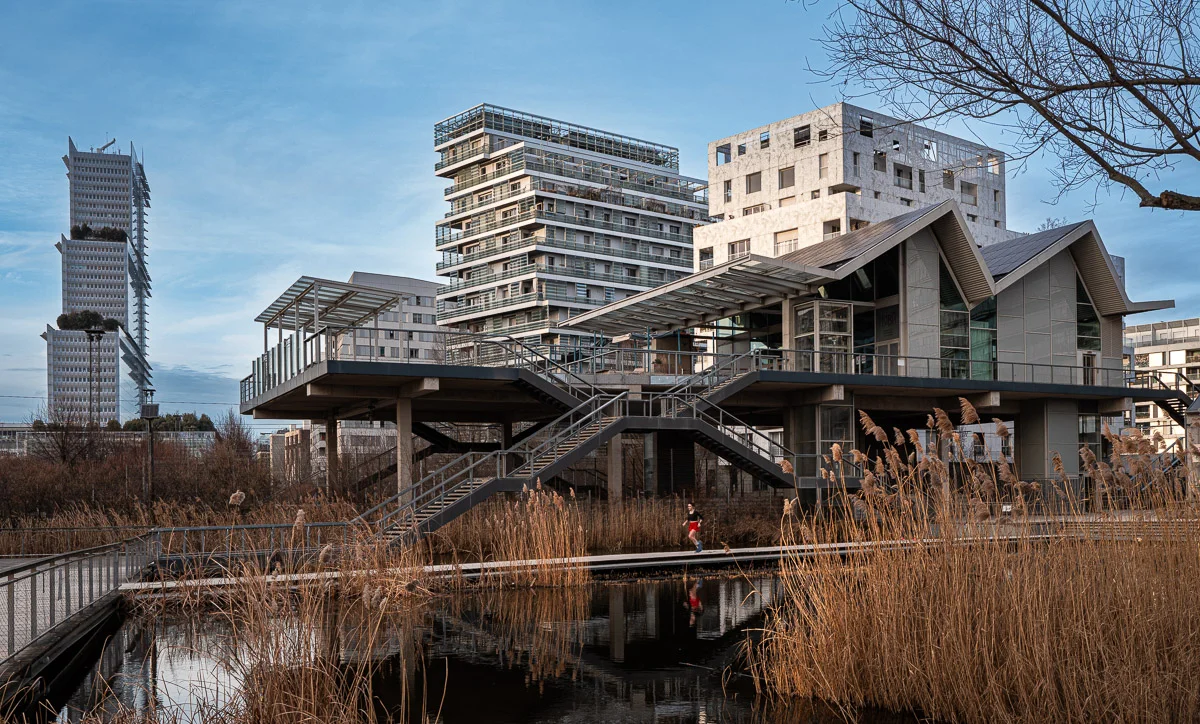Property manager and co-owners' association: what are the differences and what are their roles?
Do you feel lost between the property manager and the co-owners' association, without really understanding who does what in your building? This article is here to untangle these key concepts of daily co-ownership management and save you a lot of confusion. Find out the specific roles of each entity, their legal obligations, and how the decision-making process works to protect the collective interests of the co-ownership. Ready to become an expert on how your co-ownership works?

Defining the basics
Let's start by clearly defining the respective roles of the property manager and the co-owners' association: the property manager is the operational arm of the co-ownership; the co-owners' association represents all of the owners.
But what exactly distinguishes them? Here we compare the fundamental characteristics of the property manager and the co-owners' association, with the aim of clearly distinguishing their roles and natures.
- Who makes up the co-owners' association? It is made up of all the co-owners of the building, whereas the property manager is not a co-owner. They may be a natural or legal person, professional or non-professional.
- Legal status: the co-owners' association is a legal entity with no commercial purpose; it has rights and obligations that are separate from those of the co-owners. The professional property manager carries out a regulated commercial activity.
- Core mission of the association and the property manager: the co-owners' association collectively decides on the decisions to be taken for the co-ownership. It is the association that makes the final decisions. The property manager is the operational arm of the association; they are responsible for implementing the decisions of the co-owners and running the co-ownership.
- In terms of responsibilities, the co-owners' association is responsible for the common areas and protecting the collective rights of the co-owners. The property manager is responsible for the smooth running of the association and the financial health of the co-ownership.
- Method of appointment: all co-owners are automatically members of the co-owners' association. The property manager is appointed by the co-owners during the general meeting of co-owners.
- Mutual supervision: the co-owners' association monitors the actions of the property manager. This supervision is carried out in particular through the association council and the approval of the accounts at the general meeting. The property manager must report on their management to the co-owners' association.
To summarize simply, the co-owners' association is made up of all the co-owners; the property manager is the entity that runs the co-ownership on a daily basis.
The property manager and the co-owners' association are legally inseparable: the property manager acts in the name and on behalf of the association. In reality, this complementary relationship exists to ensure the proper management of the co-ownership and to defend the interests of all parties.
Patrick explains the difference between a property manager and a co-owners' association.
Specific roles and responsibilities: key points to remember
To understand how a condominium is managed, it is important to clearly distinguish between the roles and responsibilities of the property manager and the condominium association. This is an important point for balanced and transparent management. The comparative table below details the division of responsibilities between these two entities so that you have a clear understanding of the roles of each.

In summary: this table provides an overview of the respective responsibilities of the property manager and the co-owners' association in the management of a condominium.
{{cta-vert-en}}
The co-owners' association has legal obligations, particularly with regard to the maintenance of the building and the protection of the collective interests of the co-owners. It should be noted that this mechanism exists automatically as soon as a building is divided into lots; it is an essential structure for the proper functioning of the co-ownership.
In practical terms, the property manager is responsible for the day-to-day administration of the building, organizing meetings, managing finances, and ensuring compliance with the co-ownership rules. The property manager organizes and holds general meetings, adhering to the deadlines for convening them, thus ensuring that all co-owners are informed and can participate in important decisions. The property manager is responsible for the administrative, financial, and technical management of the building, while ensuring that the decisions voted on at meetings are rigorously applied. To find out more about Minutes of General Meetings of Co-owners, see our dedicated article, where you will find useful information.
Decision-making process in co-ownership
The co-owners' association makes its decisions at general meetings. Votes are organized according to specific majority rules set by law and the co-ownership agreement.
How does this decision-making process work in practice? The following phases cover the entire cycle, from identifying an initial need to implementing the decisions taken at the meeting.
- Identification: a need or problem arises within the co-ownership. The initiative may come from a co-owner, the association council, or the property manager themselves.
- Proposal: a resolution is proposed. In practice, the board of trustees provides assistance before submitting it to the property manager for inclusion on the agenda of the next general meeting.
- Voting: at the general meeting, the co-owners vote on the proposed resolution, ensuring that the rules laid down by law and the co-ownership regulations are respected.
- Execution: the property manager is responsible for implementing the resolution. They are then responsible for complying with the terms and deadlines set by the general meeting. To do this, they may call on external parties.
- Follow-up: it is the property manager who is responsible for monitoring the implementation of the decision and regularly reporting on its progress at subsequent meetings. The co-owners' association may also check that the decisions are being properly implemented.
This process ensures collective and transparent management of the co-ownership. It means that each co-owner can participate in joint decisions and monitor their implementation.
The property manager plays a key role in implementing the decisions made by the co-owners' association. Their job is to implement the decisions made at meetings, while ensuring that the terms and deadlines set by the meeting are respected.
Practical aspects of management
Choosing a professional property manager is an important decision for the effective management of your co-ownership. As a real estate professional, I advise you to weigh the pros and cons. It is really important to carefully consider several criteria: their availability, responsiveness, and transparency in management.
Property managers are subject to rigorous controls and strict accounting obligations. Transparency is essential, thanks to an extranet for sharing documents. Since your property manager must provide financial guarantees and act in the best interests of the co-ownership, particularly by reducing expenses, it is important to remain vigilant.
{{cta-bordeaux-en}}
Relations between stakeholders
Mandate of the property manager
The property manager's mandate is governed by a management contract. It should be noted that the general meeting of co-owners determines the term of this contract: the maximum term of a property manager's mandate is three years, and it is renewable.
The property manager administers the co-ownership, but their decision-making power is not unlimited. In concrete terms, their role is to implement the decisions taken at the general meeting. They do not have the right to replace the general meeting or to take decisions that fall within the competence of the general meeting.
Control by the co-owners' association
The co-owners' association has several levers at its disposal to monitor the property manager's accounts. The association's board is responsible for organizing a competitive bidding process for different property management contracts ahead of the general meeting.
In the event of repeated breaches by the property manager, the co-owners may dismiss them from their duties. This procedure is designed to ensure transparent and efficient management of the co-ownership, thereby guaranteeing that the property manager acts in the interests of the co-owners and in accordance with their obligations—a guarantee of transparency for the co-ownership.
Understanding the role of the property manager is crucial for the smooth management of your building. Mastering the decision-making processes and scrupulously respecting everyone's obligations will enable you to guarantee the long-term future of your property: this is a wise investment for your peace of mind and the value of your assets.




